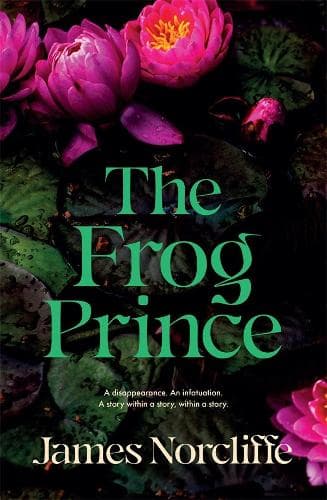Review: The Frog Prince
Reviewed by Jessie Neilson
The cover of James Norcliffe's latest work is extravagantly ebullient, a bunch of bright pink waterlilies parading their eccentricity. Below them, however, are lily pads and dingy water quite nondescript; dark and impenetrable, anything could lurk beneath.
The title too is eye-catching. The Frog Prince, it unashamedly proclaims, in vivid frog-like green. So are we to anticipate a historical drama, a reworked fairy-tale or something quite different? In fact, the reader is in for all of these as allegorical frames enclosed within the third dimension of a compelling contemporary story. These layers are hinted at early when our main character visits a scene of nostalgia, "as if he were climbing into and out of the past simultaneously."
While this is Lyttelton-based Norcliffe's first adult novel, it bodes very brightly for more to follow. With an extensive anthology of novels and other works for young people, many poetry collections, an adult short story collection and a teaching background, Norcliffe is a knowledgeable and careful crafter of intriguing stories.
The Frog Prince is anything but narrow in focus, its author including literary history and technique, children's folk stories, 20th century European history and human relationships with all their faults and missteps. It is also highly engaging, despite most of its characters being deceitful or at least downright unpleasant.
The main story is set in northern France, around Arras, where the pull of recent history is evident in the array of surrounding monuments and graveyards. This narrative seems deliberately stronger, for it forms the concrete basis for the novel diving into the past. The main character here remains one of the few worthy of empathy. Through a third person narrative we learn of New Zealander David, an English teacher at pretentious Huntingdon International School. "Headmaster" Michael Bastion, pompous in tone and attire, tolerates the slightly shabby David as long as neither he, nor anyone else for that matter, rocks the boat. He will not abide waves or even the merest ripple. However, the ship is in for a severe jolt once David's short-lived relationship with fellow teacher, American Cara Bernstein, abruptly ends with her disappearance.
Personality-wise, David and Cara are poles apart: the former an easy-going Kiwi out to explore the world, while the latter holds her cards right against her chest. When she disappears, her colleagues realise how little they know about her. From this moment, the gossip machine twirls continually, a "Greek chorus thing of whispers and nudges."
This narrative is interspliced with a historical story set around Wilhelm and Jacob, the Brothers Grimm, in 1810 in Kassel, Germany. Also told in third person, we read of two young sisters and their attentions towards the two brothers. Here is a tale involving more tales - those fabulous and symbolic, with all we come to expect from a fairy-tale from the hands of Grimm.
Norcliffe structures his novel precisely, with fair attention given to both strands. The clear structure is reassuring, avoiding any authorial posturing or unneeded complexity. Readers are surrounded by layers of symbolic meaning, aided by the dark woods and dark paths of now and of yore, reminiscent of gingerbread houses, witches and bad deeds.
The one quibble would be inconsistencies in the main female's character. While at times her behaviour borders on being ruthless and wholly disingenuous, at other times she presents herself as naive and disarming. This aside, Norcliffe's delight of landscape, nature, myth and pure love of story power through the work. Throughout his interweaving stories, art's aesthetics and pure enchantment work to burst out of reality's murky and uncertain depths.
Reviewed by Jessie Neilson
